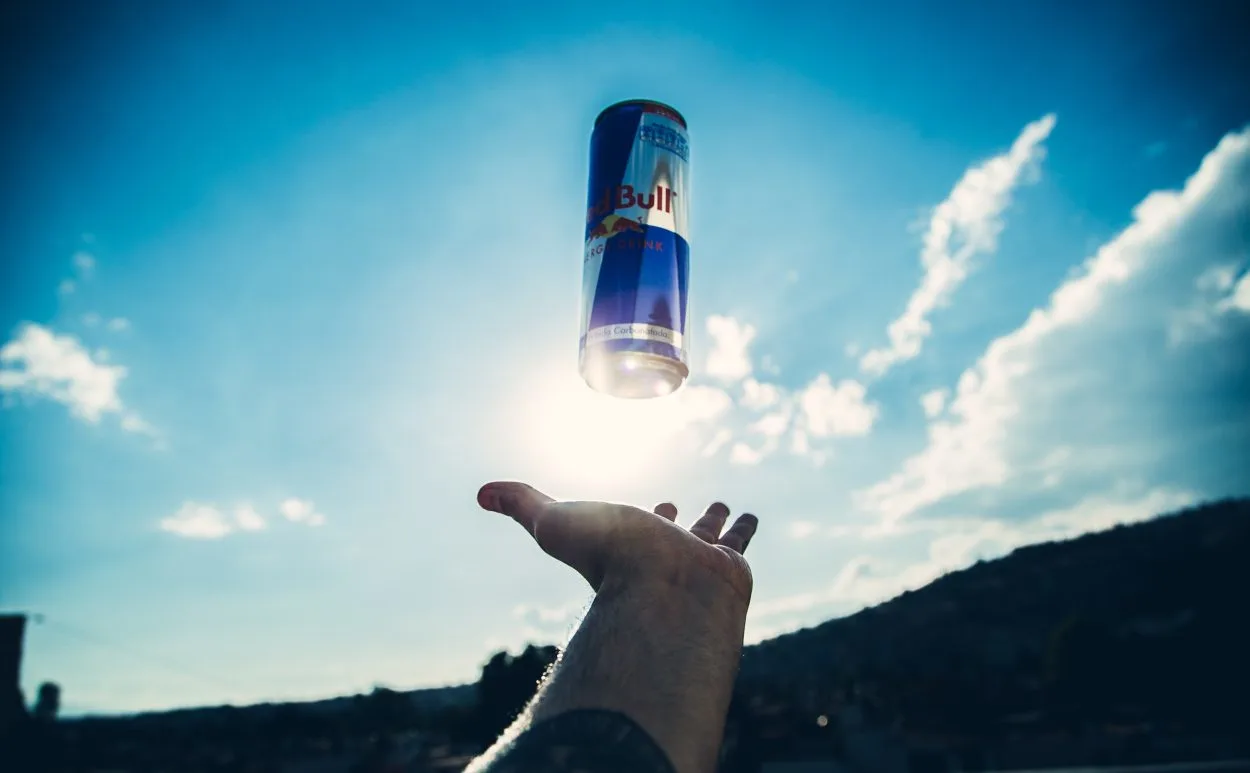
I’m sure you know about Red Bull through its famous slogan that says, “Red Bull gives you wings.”
Red Bull is one of the most consumed energy drinks, it’s wildly popular and it’s the highest-selling energy drink in the world. It’s marketed as a way to increase energy and boost mental and physical performance.
Red Bull may not be as strong as compared to other energy drinks in terms of caffeine content, but it consists of a unique blend that is fairly popular, especially among athletes and teens.
It’s believed to be a great way of improving concentration and boosting physical performance.
However, the question at hand is, is Red Bull Carbonated?
Red Bull is a carbonated beverage, that comes in several varieties. An 8-ounce can of Red Bull has 80 mg of caffeine content and 27 g of sugar.
While Red Bull is sometimes consumed in an immoderate amount, people may be developing several health conditions as they’re unaware of the life-threatening side effects that Red Bull has the potential to cause.
There’re several different flavors of Red Bull, watch this video to get familiar with all the different flavors.
Let’s get into it and learn about what makes Red Bull carbonated and what makes it too special for the public appeal.
Contents
What Are Carbonated Drinks?
Carbonated drinks are made by mixing carbon dioxide in an aqueous solution. The presence of this substance can make a drink bubbly and fizzy. Carbonated beverages include spring water, soda, and beer.
Although the ingredients in carbonated drinks are safe, these beverages may cause some side effects. Carbonated drinks are also high in sugar content which may be associated with obesity, type 2 diabetes, and weight gain.
Here’s a list of side effects of carbonated drinks:
- Tooth decay.
- Belching and Heartburn.
- Increased risk of obesity.
- Poor nutrition.
- Reduced bone strength.
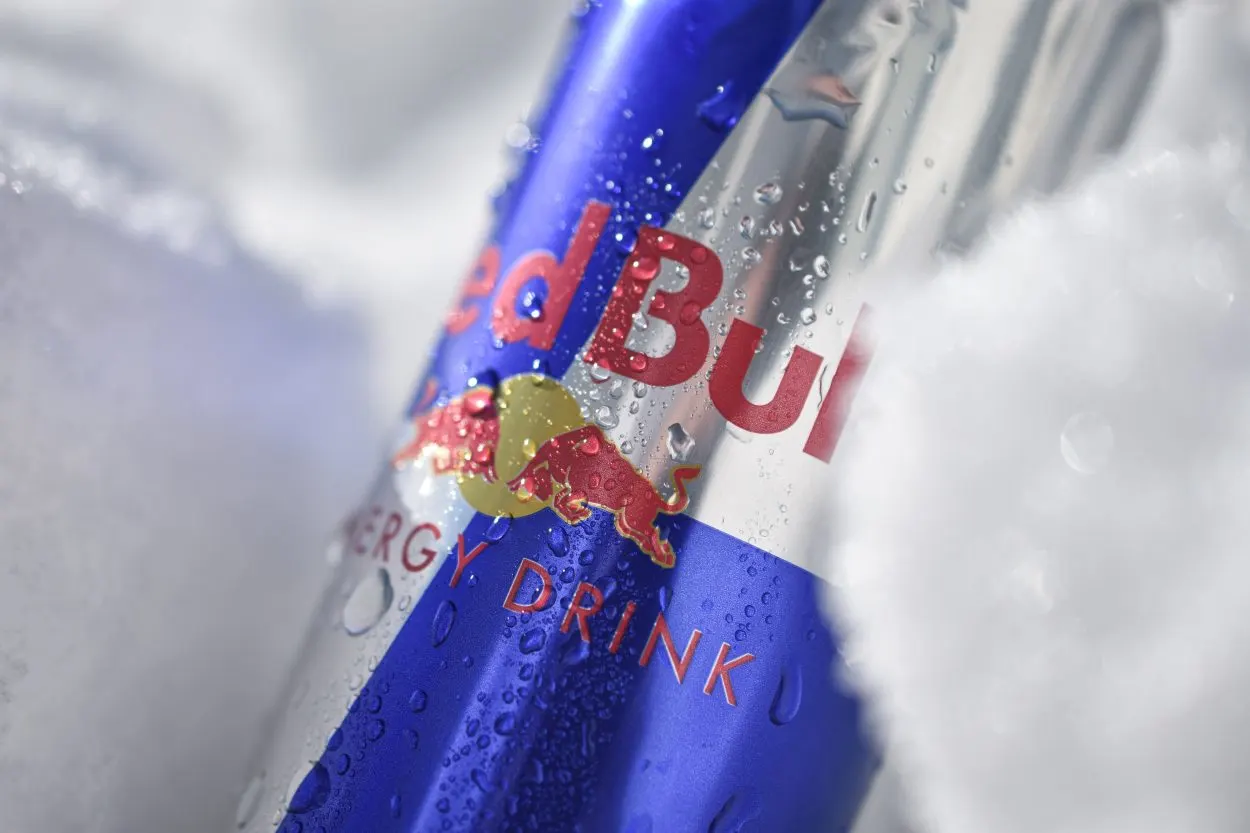
Tooth Decay
Regular consumption of carbonated drinks can have harmful effects on your teeth. Regular and diet carbonated soft drinks can harm your teeth.
Your mouth contains bacteria and carbonated drinks are packed with sugar, which means the bacteria will feed on that sugar and produce chemicals that will break down the enamel of your teeth.
A cavity appears when the erosion of the enamel exposes the inner core of teeth. Thus when you consume carbonated drinks, sugar remains in your mouth, and that results in tooth decay.
Moreover, carbonated sodas contain phosphoric acid that can further increase the risk of developing cavities as these chemicals gradually destroy the enamel of your teeth.
Belching And Heartburn
As carbonated drinks have dissolved carbon dioxide, it converts into gas when it warms to your body temperature in your stomach.
Thus drinking carbonated beverages can possibly cause repeated belching when your stomach stretches from that collection of carbon dioxide gas.
Moreover, foods and acid come up to your food pipe while belching, which causes heartburn and a sour and sickening taste in your mouth.
Increased Risk Of Obesity
Consumption of sugar-sweetened drinks can add calories to your diet, and that can potentially increase the risk of weight gain and eventually obesity.
Moreover, overweight and obese can develop type 2 diabetes, heart disease, and osteoarthritis.
Poor Nutrition
Consuming carbonated drinks has adverse effects on your nutrient intake. Consumption of such beverages can reduce your intake of proteins, starch, dietary fiber, and vitamin B-2.
Reduced Bone Strength
People who consume carbonated drinks have weaker bone strength.
In research, it was found that the women who have regular consumption of diet cola tend to have much weaker hipbones as compared to the women who don’t consume such beverages.
Ingredients And Nutrition Values in Red Bull
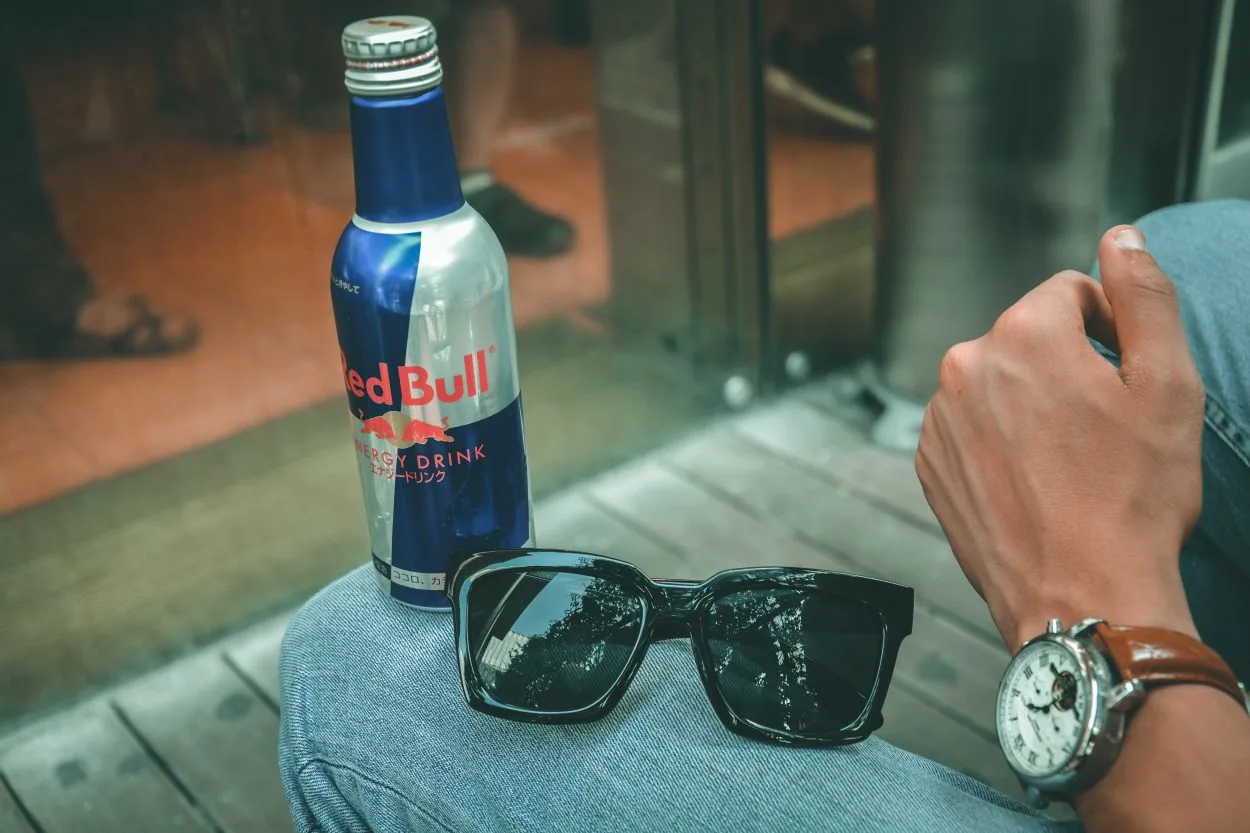
Here’s a list of all the ingredients that are present in Red Bull.
- Carbonated Water
- Sucrose
- Glucose
- Citric Acid
- Taurine
- Sodium Bicarbonate
- Magnesium Carbonate
- Caffeine
- Niacinamide
- Calcium Pantothenate
- Pyridoxine HCL
- Vitamin B12
- Natural and Artificial Flavors
- Artificial Colors
As you can see, Red Bull contains carbonated water, here’s something you may not know.
Carbonated water amplifies caffeine greatly which results in providing an energy boost that will get you through the day.
Now, let’s examine the nutrition facts of the Red Bull energy drink through the table below.
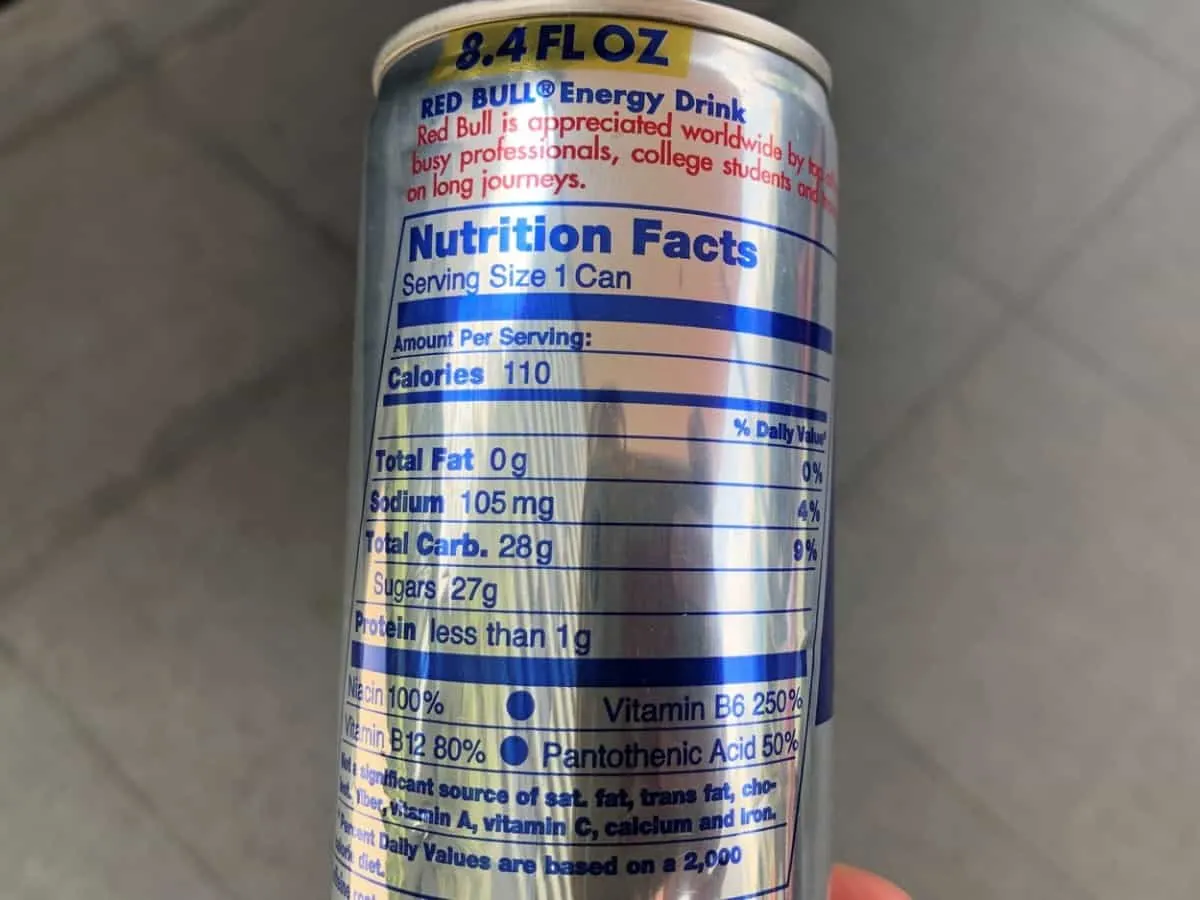
| Nutrients | Amount per 8-ounce |
| Energy | 110 calories |
| Fat | 0g |
| Sugar | 27g |
| Caffeine | 80mg |
| Sodium | 105mg |
| Vitamin B3 (Niacin) | 22mg |
| Vitamin B5 (Pantothenic Acid) | 5.05mg |
| Vitamin B6 | 5.05mg |
| Vitamin B12 | 5.1µg |
Caffeine Content In Red Bull

An average American adult consumes 200 mg of caffeine daily, however, FDA recommends keeping the consumption of caffeine to 400 mg (about four to five cups) every day.
While 400 mg may not be too much for some people, for caffeine-sensitive people, 400 mg can send them to ER.
Red Bull has a fair amount of caffeine, which is 80 mg per 8-ounce can.
Too much caffeine has its side effects which include:
- Restlessness.
- Shakiness.
- Insomnia.
- Headaches.
- Dizziness.
- Fast heart rate.
- Dehydration.
- Anxiety.
- Dependency.
How Much Sugar Is There In Red Bull?
Just like with caffeine, you also have to keep track of your sugar intake, the AHA recommends 36g of sugar for men and 25 g or less for women.
That being said, the amount of sugar that Red Bull contains is about 27g per 1 can of 8.4 fl oz.
Red can also be harmful to your health if consumed in immoderation, so refrain from consuming more than two cans of Red Bull if you’re a healthy adult. However, if you’re sensitive to caffeine you should only drink one can or none in order to avoid any side effects.
Sugar is a part of almost every energy drink’s formula, so it’s essential to keep your intake of energy drinks in moderation.
It has been proven that immoderate consumption can lead to health complications, however, moderate consumption will help you avail benefits of energy drinks.
Here’s a list of health complications that are caused by immoderate consumption of sugar:
- Weight gain
- Increase risk of heart disease
- Acne
- Risk of diabetes
- Increased risk of cancer
- Depression
- Skin aging
Here’s a list of its benefits:
- boosts of energy
- Stores fat
- Instant mood boost
- Improves thinking skills
Is There Taurine in Red Bull?

An 8-ounce of Red Bull can contain 1 gram of taurine, while taurine may be healthy for your body, often in cases of excessive consumption taurine can cause health complications.
However, taurine has some incredible benefits as its role is to modulate the contractile function and more.
Taurine is present in foods like meat and seafood, and the typical American diet provides about 123 mg to 178 mg of taurine per day.
According to research, an 8-ounce of energy drink will boost your regular intake of taurine to 6 to 16 times.
That said, too much of anything is bad for you, so don’t rule out the fact that too of taurine will not cause any health complications.
While high doses of taurine may not cause health complications, lack of taurine on the other hand can lead to:
- kidney dysfunction
- developmental disorders
- damage to eye tissues
- cardiomyopathy, which is a significant risk factor for heart failure
Is There A Non-Carbonated Red Bull?
Krating Daeng is the original Red Bull that originated in Thailand. It’s the non-carbonated version of the regular Red Bull.
While Red Bull has a wide range of flavors and sizes, Krating Daeng, offers only the regular and sugar-free variants in two sizes which are, 100ml and 250ml.
Moreover, Krating Daeng has a lower content of caffeine, which makes it much lighter than Red Bull.
Krating Daeng has a unique yet pleasant flavor, however, the sugar, as well as calorie content, is too much to ignore. That’s why I wouldn’t really recommend it, but if you want to be the daredevil then drink at your own risk.
How Many Red Bull Can You Drink a Day?
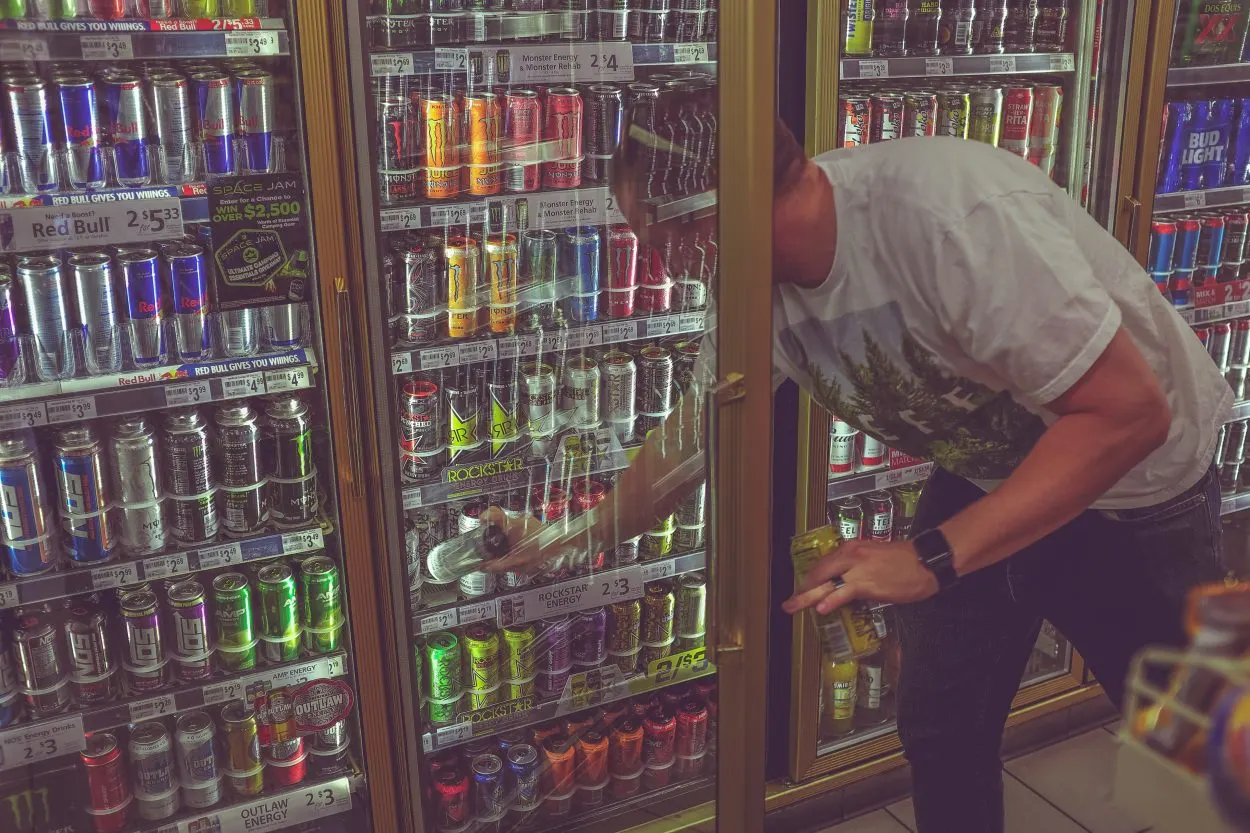
Drinking more than 3 Red Bull cans may be harmful to you. But, if you’re sensitive to caffeine try to limit yourself to only 1 can.
Irregular caffeine intake is associated with countless side effects. An abrupt cutback from caffeine often leads to withdrawal symptoms that include:
- Headaches.
- Tiredness.
- Muscle pain.
- Irritability.
- Difficulty concentrating or functioning.
- Nausea.
Insomnia
In general, energy drinks are good if you want to get rid of any tiredness. That said, immoderate consumption can lead to insomnia.
Type 2 Diabetes
Sugar is another main ingredient in energy drinks and there’s research that shows that consuming sugary beverages regularly leads to an increased risk of developing type 2 diabetes.
Risky behavior
Caffeine provides an adrenaline rush, and we know that teens are extremely adventurous, therefore an adrenaline rush and teens don’t go together, they may attempt something dangerous that can lead to injuries or legal trouble.
Vomiting
When our body isn’t used to something it often tries to get rid of it, and as our bodies are unable to handle too many energy drinks with a high quantity of sugar and caffeine, it results in vomiting.
Allergic Reactions
Energy drinks are produced with several different ingredients, while some people may not be allergic to those ingredients, they’re a small group of people who may be allergic to some of those ingredients and that leads to allergic reactions.
High Blood Pressure
A study examined that after consuming energy drinks, systolic blood pressure increases by 6.2%.
Mental Health Problems
A military study says soldiers who consume more than two energy drinks regularly are most likely to suffer from mental health problems.
Alternatives to Red Bull

Red Bull is an amazing energy drink as it contains a fair amount of caffeine. That being said, the sugar content is slightly higher than what is recommended by AHA. So here’s a list of alternative energy drinks that contain low contents of sugar as well as caffeine.
Conclusion
- All the Red Bull variants are carbonated, however, the earlier version known as Krating Daeng is a non-carbonated drink.
- Carbonated drinks can cause heartburn and tooth decay.
- An 8.4 fl oz of Red Bull can contain 80 mg of caffeine, 27 g of sugar, and 1 g of taurine.
- Taurine overdose has not been found to cause any side effects. On the other hand, lack of taurine can lead to some health complications like kidney dysfunction and damage to eye tissues.
- The safe limit of Red Bull consumption is 3 cans. That said, I’d suggest that you limit yourself to only one can of Red Bull per day because of its high sugar content.
